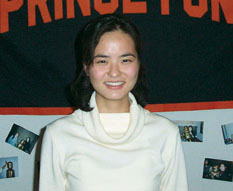|
Web Exclusives:PawPlus
Becoming
a historian and activist In the process of researching the plight of the Korean women who were sex slaves to Japanese soldiers during WWII, Sarah Seo realized that a historian can pursue a cause and help people at the same time. But she also came to understand that there's a fine but crucial line between activist-historian and humanitarian. "You need to maintain boundaries to protect the personhood of the people you're helping," she says. For her senior thesis, Seo has studied the feminist movement that has championed the Korean women known as former comfort women. The movement, which took shape in the late 1980s as educated Christian feminists took the lead, has brought to light the "silent history" of these women and has sought legal recompense and a formal apology from the Japanese government — both of which haven't yet come. The movement has documented the former comfort women's accounts of their sexual abuse and substantiated the Japanese government's role in establishing comfort stations. By articulating the abuse as a crime against human rights, the feminists gave the victims a "language to talk about their suffering. They gave them a way to say I've been wronged" and still feel dignity as a human being, says Seo. The activists have helped reconceptualize that event in history, adds Seo, by helping the former comfort women to see themselves not as "fallen" women and societal outcasts but as victims of patriarchy and oppression. As part of that effort, the feminists have organized "tours" on which the women speak about their experiences and even established a museum, The Historical Museum of Sexual Slavery By the Japanese Military, in Kwangju, South Korea, about one hour from Seoul, and a communal house, the House of Sharing, for them right next door. Although Seo praises the enormous good the movement has effected for the former comfort women, she also believes it has forced them to continue living their horrid past. The feminists' insistence on the women's giving testimony at a weekly demonstration in front of the Japanese embassy and other places means that they can never really let go. "I sometimes wish that this movement could be the work of the feminists and just let [the former comfort women] live," says Seo, who met with activists and former comfort women last fall and has become an activist herself. Born in Korea, Seo says she understands how hard it was for the former comfort women to declare publicly what happened to them in the Japanese war camps, especially when the Japanese government at first denied that the women were forced to have sex with the soldiers. Seo pursued this thesis, she says, "because I wanted to know what made them start talking." Her own father, now a pastor in Washington, D.C., is "uncomfortable" discussing the history because it involves sex, says Seo. Thanks to the work of the feminist movement, most officials in the Japanese government have admitted that Korean women were sex slaves to the Japanese army, but the government refuses to pay legal compensation or offer a formal state apology. The Japanese government did initiate a fundraiser, asking Japanese citizens to donate to the women. But the feminists want the money to come from the government and told the women "your dignity would be hurt if you accept this money," says Seo. So most didn't take it. Today, nine former comfort women live in the communal house and receive an allowance from the South Korean government. Afraid of damaging its economic and diplomatic relations with Japan, the Korean government is not aggressively pursuing monetary damages from the Japanese government. "Fighting over this issue isn't worth it for them," says Seo. One feminist told Seo about the future of the movement: "We're at a stalemate. We've done everything we can do. We've gone to the U.N., and the U.N. has basically taken our side, but nothing's happened with Japan." During her visit last fall to the House of Sharing, Seo carved pumpkins with the women, shared a meal, and just spent time chatting with them. At first Seo didn't know what to say. But one of the women broke the ice, asking her about boyfriends, telling her she was too skinny, and giving her advice on what "kinds of guys make good husbands." After her stay with them, she says, "I learned that [their history] is not all of them. They just wanted for themselves a normal life," says Seo. "And normal in Korea is having a family." At the end of the war, many of them were abandoned or killed by the retreating Japanese forces, says Seo. Some of them who survived worked as prostitutes, in the entertainment industry, or opened restaurants. Many of them are poor, and as single women in Korean society find it hard to be accepted. "Even after this thesis, I'll be involved in this issue,"
says Seo, who participates in events sponsored by the Washington
Coalition for Comfort Women. Next year she will work as a missionary/humanitarian
through her father's Washington, D.C. Presbyterian church in either
Africa or China. "I've been sheltered my whole life, especially
at Princeton," says Seo. By K.F.G.
|

 June
5, 2002:
June
5, 2002: